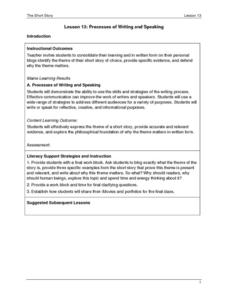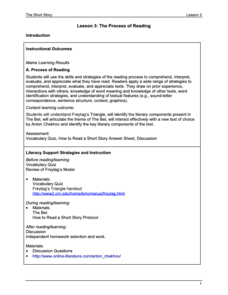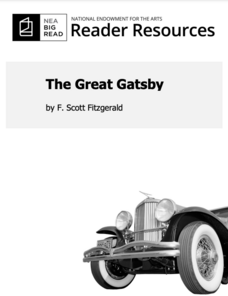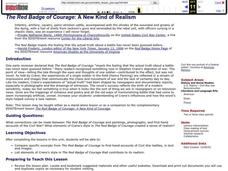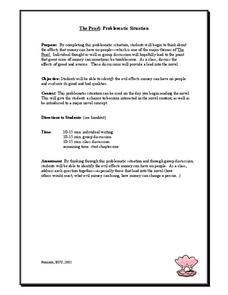Maine Content Literacy Project
Processes of Writing and Speaking
As this short story unit comes to a close, provide a day for a full examination of theme and allow some time in class for individuals to work on their various assessments. This final lesson before presenting iMovies and portfolios is the...
Maine Content Literacy Project
Introduction to The Lottery, by Shirley Jackson
"The Lottery" by Shirley Jackson is a great story to share with your class, and this lesson focuses on just that story! The eighth in a fourteen-lesson series on short stories, the plan has learners study some vocabulary, read the story,...
Maine Content Literacy Project
Introduction to Ernest Hemingway
What is a white elephant, and what does it have to do with Ernest Hemingway? Study "Hills Like White Elephants" in-depth by following the procedures outlined in this lesson, the fifth in a series of fourteen. Learners start the day with...
Maine Content Literacy Project
Introduction to John Updike
Expand your pupils' understanding of the short story genre with a study of John Updike and his story "A&P." This lesson, the fourth in a series of fourteen, invites learners to examine literary terms and read and discuss the story....
Maine Content Literacy Project
The Process of Reading vocabulary, literary elements
Cover Freytag's Triangle and examine Anton Chekhov's "The Bet" in this third lesson plan in a series of fourteen based around short stories. Learners take a quiz and discuss Freytag's triangle. They apply the triangle to "The Bet" and...
Maine Content Literacy Project
Dramatic Structure of the Short Story
The second lesson in a series of fourteen, this plan takes the short story basics a step further. Learners complete a quiz about the story from the previous day, discuss the text, learn about Anton Chekhov, and work in groups to begin...
Maine Content Literacy Project
Introduction to the Short Story
How should pupils read short stories? Set them up for this unit with an introductory instructional activity that goes over the main characteristics of a short story and starts learners off reading their first short story of the unit. In...
National Endowment for the Arts
Teacher's Guide: The Great Gatsby by F. Scott Fitzgerald
A 10-lesson unit takes high schoolers through a novel study of F. Scott Fitzgerald's The Great Gatsby. To start, students learn about Fitzgerald's background and gain historical context that prepares them for a reading of the book. The...
National Endowment for the Arts
Reader Resources: The Great Gatsby by F. Scott Fitzgerald
A handy guide offers high schoolers support as they read the American novel, The Great Gatsby. Complete with a biography of F. Scott Fitzgerald, a timeline of the Roaring Twenties, discussion questions about the novel, and more, this...
PBS
Supernatural Shakespeare and Macbeth
"A drum, a drum! Macbeth doth come." The withered and wild witches of Shakespeare’s Scottish play launch an examination of the fantastical elements in Act I, scene iii, paying particular attention to the action, imagery,...
National Endowment for the Humanities
Mark Twain and American Humor
“The Celebrated Jumping Frog of Calaveras County” is famous, in part, because it established a uniquely American form of humor. For this famous story, Mark Twain combines the tall-tale, the dialect story, and satire. Here is a resource...
Curated OER
The Poetry Archive
Listening to poems about feeling lonely and feeling like an outsider set the stage for a group activity that focuses on Stevie Smith's "Not Waving But Drowning." Groups examine the three stanzas of Smith's poem separately and identify in...
Central Oregon Community College
Things Fall Apart Study Guide
“There is no story that is not true.” And Chinua Achebe’s Things Fall Apart, uses proverbs (“. . .the palm-oil with which words are eaten”), a compelling tragic hero, and historic events, to engage readers in the truth of his story of...
Southern Nevada Regional Professional Development Program
Was Bias A Factor? Make an Argument
The ability to analyze an argument is a skill emphasized by the Common Core standards. Offer your class an opportunity to develop and hone their skills by providing them the testimonies in an Oregon court case. After reading the facts of...
Shakespeare Uncovered
Suits of Woe: Grief and Loss in Hamlet
“Thou know’st ‘tis common; all that lives must die/Passing through nature to eternity.” Grief, and the response to grief and loss, is the focus of a series of activities that uses Hamlet as a launchpad. Groups examine Act I, scene ii to...
Japan Society
Akutagawa Ryunosuke and the Taisho Modernists
Japan's Taisho Period was a time when authors like Akutagawa and other Japanese modernists began to experiment with point of view and literary form, making the literature produced during this time period a natural choice for teaching...
Japan Society
Changing Times, Changing Styles: New Japanese Literary Styles of the Late Nineteenth Century
Focusing on Doppo's "Unforgettable People" and late nineteenth century Japanese literature, this resource also leads to discussions of form being dictated by content. Explore the development of new literary styles first-hand by...
Pulitzer Center
"Voices from Haiti": Using Poetry to Speak up for a Cause
Explore a real world use of poetry with your class! Young language arts pupils consider the concept of advocacy and how journalism, photography, and poetry can raise awareness for a cause. They read several poems about individuals...
Curated OER
Moral Development in Camus' The Stranger
“In the depth of winter, I finally learned that within me there lay an invincible summer.” Readers of The Stranger rate Mersault’s moral development (or lack thereof) using Kohlberg’s Theory of Moral Development scale. Using specific...
Curated OER
Measure for Measure: Anticipation Guide
Be bold and never fearful! Tempt your scholars with an Anticipation Guide for Measure for Measure. Before reading Shakespeare’s problem play, class members label a series of statements as either true or false in their opinion. (It’s okay...
Curated OER
Exploring Contrasts in "The Lanyard" by Billy Collins
Middle schoolers analyze the speaker's ideas and tone in the Billy Collins poem "The Lanyard." After identifying how each of the five senses is addressed in the poem, they compare images to draw conclusions about the speaker and his...
American Library Association
Creating 21st Century Superheroes
Create 21st century learners by utilizing technology and library databases. Scholars explore the concept of comic books as literature and create a superhero who could uniquely solve a 21st century global issue. Databases such as SIRS are...
Curated OER
The Red Badge of Courage: A New Kind of Realism
Is it possible to tell a true war story? Tim O’Brien says that fiction is for “getting at the truth when the truth isn’t sufficient for the truth.” To get at the truth about war, class members examine primary source materials from the...
Curated OER
The Pearl: Problematic Situation
Is money the root of all evil, or the answer to everyone's dreams? Analyze the role of money in John Steinbeck's The Pearl with a writing prompt where kids imagine that they have won the lottery, and must think about the ways it will...


